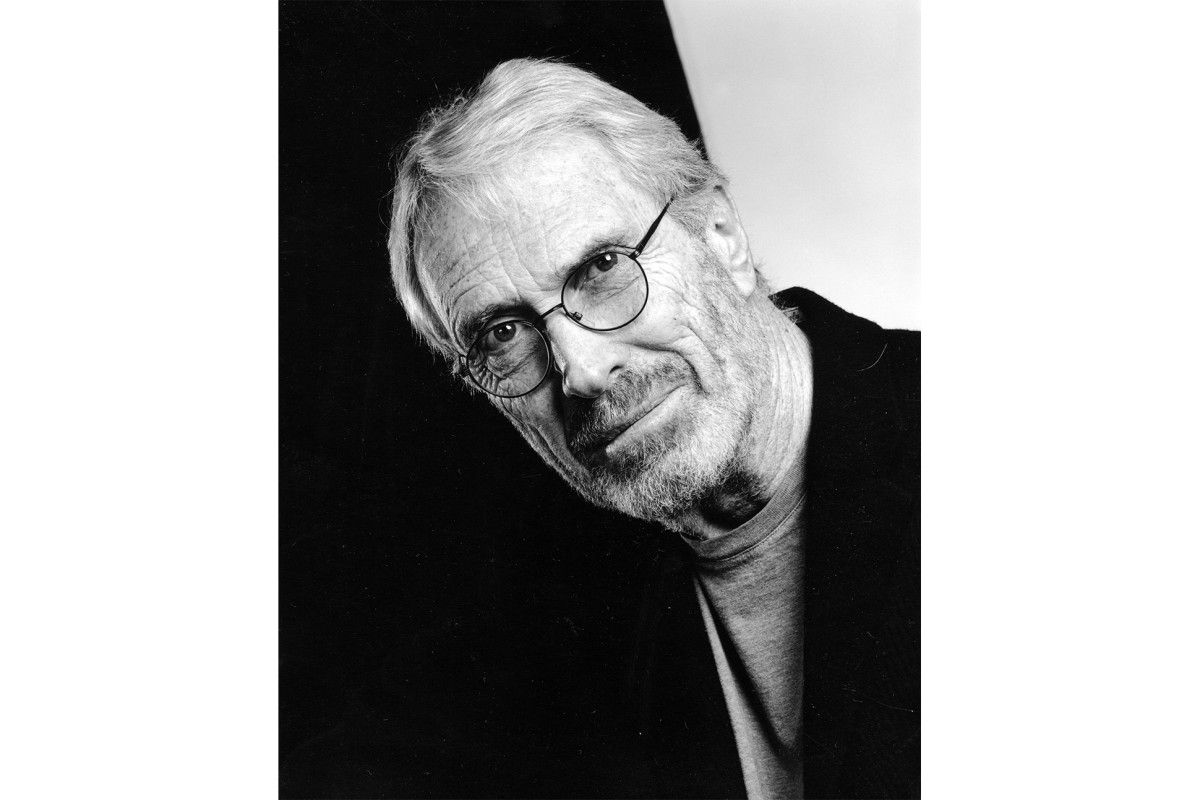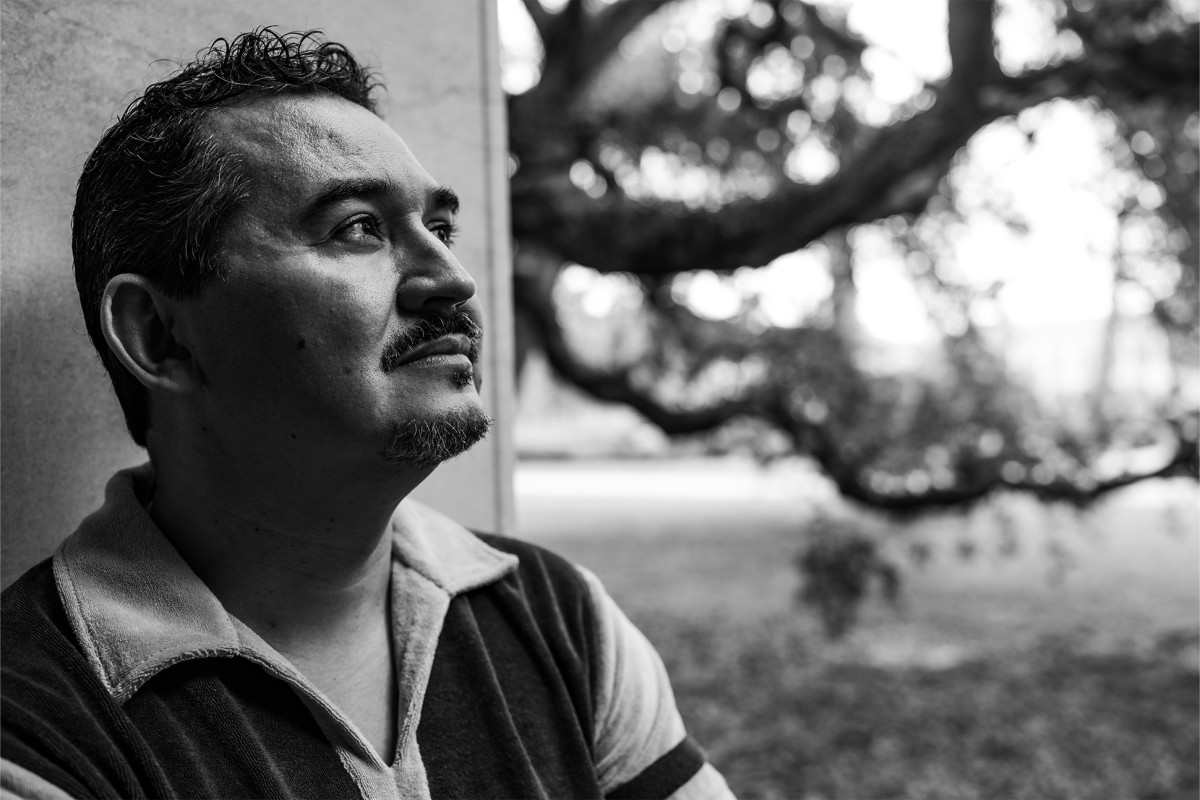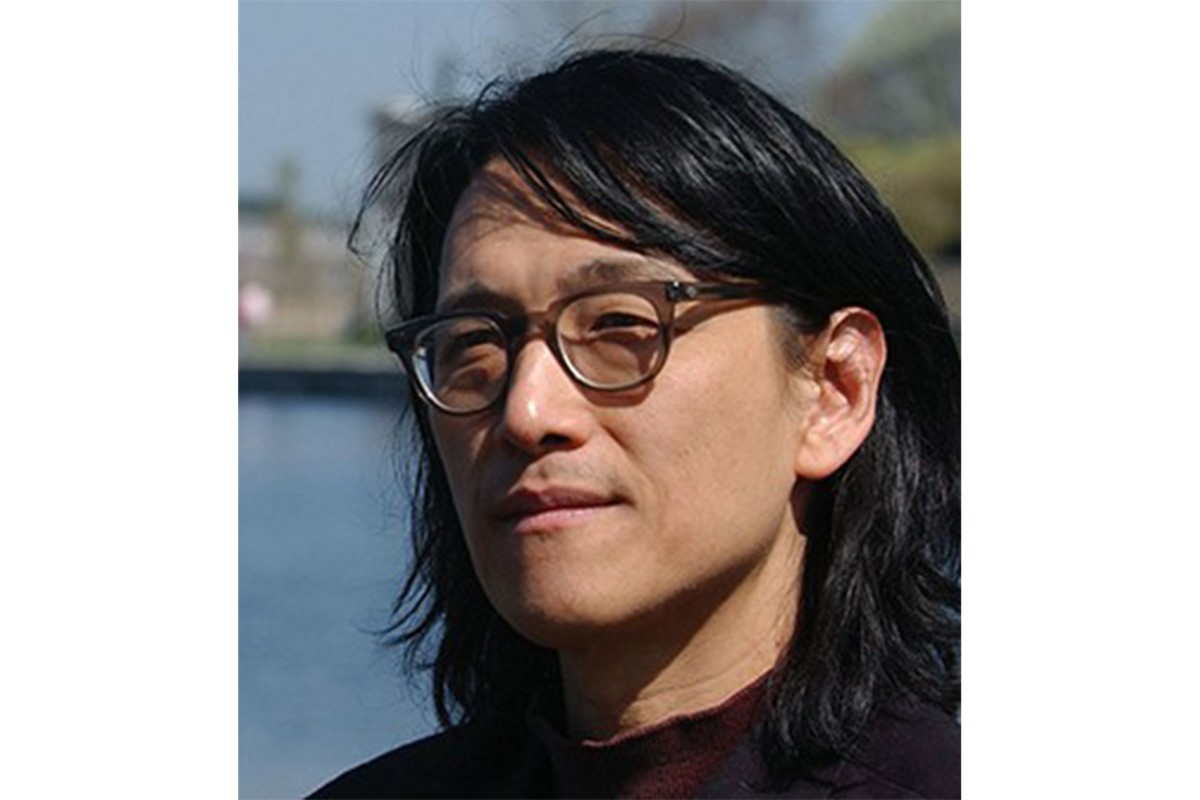The Cleaving
By Li-Young Lee
He gossips like my grandmother, this man
with my face, and I could stand
amused all afternoon
in the Hon Kee Grocery,
amid hanging meats he
chops: roast pork cut
from a hog hung
by nose and shoulders,
her entire skin burnt
crisp, flesh I know
to be sweet,
her shining
face grinning
up at ducks
dangling single file,
each pierced by black
hooks through breast, bill,
and steaming from a hole
stitched shut at the ass.
I step to the counter, recite,
and he, without even slightly
varying the rhythm of his current confession or harangue,
scribbles my order on a greasy receipt,
and chops it up quick.
Such a sorrowful Chinese face,
nomad, Gobi, Northern
in its boniness
clear from the high
warlike forehead
to the sheer edge of the jaw.
He could be my brother, but finer,
and, except for his left forearm, which is engorged,
sinewy from his daily grip and
wield of a two-pound tool,
he's delicate, narrow-
waisted, his frame
so slight a lover, some
rough other
might break it down
its smooth, oily length.
In his light-handed calligraphy
on receipts and in his
moodiness, he is
a Southerner from a river-province;
suited for scholarship, his face poised
above an open book, he’d mumble
his favorite passages.
He could be my grandfather;
come to America to get a Western education
in 1917, but too homesick to study,
he sits in the park all day, reading poems
and writing letters to his mother.
He lops the head off, chops
the neck of the duck
into six, slits
the body
open, groin
to breast, and drains
the scalding juices,
then quarters the carcass
with two fast hacks of the cleaver,
old blade that has worn
into the surface of the round
foot-thick chop-block
a scoop that cradles precisely the curved steel.
The head, flung from the body, opens
down the middle where the butcher
cleanly halved it between
the eyes, and I
see, foetal-crouched
inside the skull, the homunculus,
gray brain grainy
to eat.
Did this animal, after all, at the moment
its neck broke,
image the way his executioner
shrinks from his own death?
Is this how
I, too, recoil from my day?
See how this shape
hordes itself, see how
little it is.
See its grease on the blade.
Is this how I’ll be found
when judgement is passed, when names
are called, when crimes are tallied?
This is also how I looked before I tore my mother open.
Is this how I presided over my century, is this how
I regarded the murders?
This is also how I prayed.
Was it me in the Other
I prayed to when I prayed?
This too was how I slept, clutching my wife.
Was it me in the other I loved
when I loved another?
The butcher sees me eye this delicacy.
With a finger, he picks it
out of the skull-cradle
and offers it to me.
I take it gingerly between my fingers
and suck it down.
I eat my man.
The noise the body makes
when the body meets
the soul over the soul’s ocean and penumbra
is the old sound of up-and-down, in-and-out,
a lump of muscle chug-chugging blood
into the ear; a lover’s
heart-shaped tongue;
flesh rocking flesh until flesh comes;
the butcher working
at his block and blade to marry their shapes
by violence and time;
an engine crossing,
re-crossing salt water, hauling
immigrants and the junk
of the poor. These
are the faces I love, the bodies
and scents of bodies
for which I long
in various ways, at various times,
thirteen gathered around the redwood,
happy, talkative, voracious
at day’s end,
eager to eat
four kinds of meat
prepared four different ways,
numerous plates and bowls of rice and vegetables,
each made by distinct affections
and brought to table by many hands.
Brothers and sisters by blood and design,
who sit in separate bodies of varied shapes,
we constitute a many-membered
body of love.
In a world of shapes
of my desires, each one here
is a shape of one of my desires, and each
is known to me and dear by virtue
of each one’s unique corruption
of those texts, the face, the body:
that jut jaw
to gnash tendon;
that wide nose to meet the blows
a face like that invites;
those long eyes closing on the seen;
those thick lips
to suck the meat of animals
or recite 300 poems of the T’ang;
these teeth to bite my monosyllables;
these cheekbones to make
those syllables sing the soul.
Puffed or sunken
according to the life,
dark or light according
to the birth, straight
or humped, whole, manqué, quasi, each pleases, verging
on utter grotesquery.
All are beautiful by variety.
The soul too
is a debasement
of a text, but, thus, it
acquires salience, although a
human salience, but
inimitable, and, hence, memorable.
God is the text.
The soul is a corruption
and a mnemonic.
A bright moment,
I hold up an old head
from the sea and admire the haughty
down-curved mouth
that seems to disdain
all the eyes are blind to,
including me, the eater.
Whole unto itself, complete
without me, yet its
shape complements the shape of my mind.
I take it as text and evidence
of the world’s love for me,
and I feel urged to utterance,
urged to read the body of the world, urged
to say it
in human terms,
my reading a kind of eating, my eating
a kind of reading,
my saying a diminishment, my noise
a love-in-answer.
What is it in me would
devour the world to utter it?
What is it in me will not let
the world be, would eat
not just this fish,
but the one who killed it,
the butcher who cleaned it.
I would eat the way he
squats, the way he
reaches into the plastic tubs
and pulls out a fish, clubs it, takes it
to the sink, guts it, drops it on the weighing pan.
I would eat that thrash
and plunge of the watery body
in the water, that liquid violence
between the man’s hands,
I would eat
the gutless twitching on the scales,
three pounds of dumb
nerve and pulse, I would eat it all
to utter it.
The deaths at the sinks, those bodies prepared
for eating, I would eat,
and the standing deaths
at the counters, in the aisles,
the walking deaths in the streets,
the death-far-from-home, the death-
in-a-strange-land, these Chinatown
deaths, these American deaths.
I would devour this race to sing it,
this race that according to Emerson
managed to preserve to a hair
for three or four thousand years
the ugliest features in the world.
I would eat these features, eat
the last three or four thousand years, every hair.
And I would eat Emerson, his transparent soul, his
soporific transcendence.
I would eat this head,
glazed in pepper-speckled sauce,
the cooked eyes opaque in their sockets.
I bring it to my mouth and—
the way I was taught, the way I’ve watched
others before me do—
with a stiff tongue lick out
the cheek-meat and the meat
over the armored jaw, my eating,
its sensual, salient nowness,
punctuating the void
from which such hunger springs and to which it proceeds.
And what
is this
I excavate
with my mouth?
What is this
plated, ribbed, hinged
architecture, this carp head,
but one more
articulation of a single nothing
severally manifested?
What is my eating,
rapt as it is,
but another
shape of going,
my immaculate expiration?
O, nothing is so
steadfast it won’t go
the way the body goes.
The body goes.
The body’s grave,
so serious
in its dying,
arduous as martyrs
in that task and as
glorious. It goes
empty always
and announces its going
by spasms and groans, farts and sweats.
What I thought were the arms
aching cleave, were the knees trembling leave.
What I thought were the muscles
insisting resist, persist, exist,
were the pores
hissing mist and waste.
What I thought was the body humming reside, reside,
was the body sighing revise, revise.
O, the murderous deletions, the keening
down to nothing, the cleaving.
All of the body’s revisions end
in death.
All of the body’s revisions end.
Bodies eating bodies, heads eating heads,
we are nothing eating nothing,
and though we feast,
are filled, overfilled,
we go famished.
We gang the doors of death.
That is, our deaths are fed
that we may continue our daily dying,
our bodies going
down, while the plates-soon-empty
are passed around, that true
direction of our true prayers,
while the butcher spells
his message, manifold,
in the mortal air.
He coaxes, cleaves, brings change
before our very eyes, and at every
moment of our being.
As we eat we’re eaten.
Else what is this
violence, this salt, this
passion, this heaven?
I thought the soul an airy thing.
I did not know the soul
is cleaved so that the soul might be restored.
Live wood hewn,
its sap springs from a sticky wound.
No seed, no egg has he
whose business calls for an axe.
In the trade of my soul’s shaping,
he traffics in hews and hacks.
No easy thing, violence.
One of its names? Change. Change
resides in the embrace
of the effaced and the effacer,
in the covenant of the opened and the opener;
the axe accomplishes it on the soul’s axis.
What then may I do
but cleave to what cleaves me.
I kiss the blade and eat my meat.
I thank the wielder and receive,
while terror spirits
my change, sorrow also.
The terror the butcher
scripts in the unhealed
air, the sorrow of his Shang
dynasty face,
African face with slit eyes. He is
my sister, this
beautiful Bedouin, this Shulamite,
keeper of sabbaths, diviner
of holy texts, this dark
dancer, this Jew, this Asian, this one
with the Cambodian face, Vietnamese face, this Chinese
I daily face,
this immigrant,
this man with my own face.
-
Li-Young Lee, “The Cleaving” from The City In Which I Love You, published in 1990 by BOA Editions.
Source: The City in Which I Love You (BOA Editions Ltd., 1990)
https://www.poetryfoundation.org/poems/50871/the-cleaving
#poem #poetry #literature






